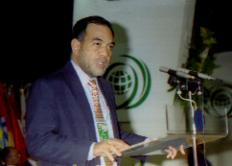


SOUTH PACIFIC FORUM SECRETARIAT - SECRETARIAT DU FORUM DU PACIFIQUE SUD - SECRETARIA DEL FORO PARA EL PACIFICO SUR | ||
Mr. Ieremia Tabai, Secretary-General, South Pacific Forum Secretariat | ||

I am grateful for this opportunity, as an observer, to make a statement on behalf of the Forum Secretariat an organization that was created to serve the political grouping in the Pacific known as the South Pacific Forum. Since its very inception, the Forum's key role has been to assist its member states in their collective efforts to pursue social, economic and political goals. The Plan of Action for endorsement at the end of this Summit represents a timely world response to an urgent situation - how to provide adequate food, and of the right quality, for an increasing world population. Our region is fortunate in that it does not suffer from the level of poverty that one sees in other parts of the world. Food insecurity is not yet considered as a critical problem. But we do have many and complex problems in our part of the world that include a high growth rate of the population, "the tyranny of distance", underdeveloped distribution systems and unequal access and the invasion of junk foods. Our vulnerability to natural and manmade disasters including external shocks is such that entire food crops can be wiped out with one cyclone. As responsible leaders, governments and organizations, we have an obligation to address these problems to ensure that the lives of our people are improved. This is the main reason our leaders endorsed and agreed to participate at this World Food Summit. Our region has for long sought to pursue sustainable development and food security in key sectors such as agriculture and fisheries. At the same time, we do realize that unless we get the basics right, the long-term solutions to the problem of food security and vulnerability will continue to evade us. I am speaking here about the need to create first the financial and economic policy environment that will ensure long-term development. In this regard, I am pleased to note here that at their last meeting in the Marshall Islands, our leaders agreed to a process of economic reforms aimed at enhancing future economic and social prospects. At the national level, a key strategy adopted by Forum countries is to support private sector development and investment in the productive sectors, where there is greater scope for sustainable employment and food security. The measures taken in pursuit of this strategy include reductions in public sector size and costs, privatization of government operations, tax reforms and reductions in subsidies to state-owned enterprises. There is also an increasing awareness of the implications of the emerging world trade arrangements like WTO or APEC. For example, our leaders recognize that full-scale participation in new trading arrangements is not always the best option. The participation of our members involves a heavy administrative burden which may be beyond the capacity of our many small island members. We in the Secretariat will be looking at these issues in an effort to assist our member countries. The approach taken by the Forum countries so far is to benchmark their trade reforms against standards set by WTO or APEC members. The Forum for instance has agreed to adopt and implement investment principles along the lines of those being drawn up for APEC economies. This is indeed intended to send a signal to potential investors that the Forum region is serious in its desire to promote and encourage foreign investment including in food production. As a first step, we are focusing on the transparency of the investment regime in the region, and I am pleased to say again that already much work in this area has been done. It is also relevant to note that in the economic reform objectives, our leaders are mindful of the need to maintain good and transparent forms of government. In this regard, they have collectively agreed on the need to have a high level of political commitment to the issues of accountability, transparency and community involvment in the reform process. In conclusion, let me say that in the immediate context of the proposed Plan of Action, our region is committed to do its part, reflected in the presence of our members here. In fact, many of the obligations and objectives being proposed have already been pursued by our member governments at the national and regional levels. While obviously the key responsibility lies at the national level, we and other regional organizations in our part of the world stand ready to assist our member countries to meet the call of this Summit. | ||

 |